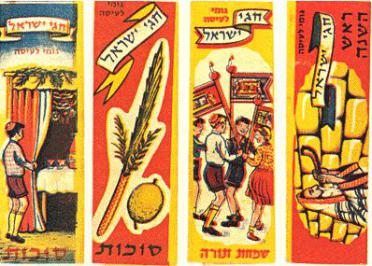Every week, parshaoftheweek.com brings you a rich selection of material on parshat hashavua, the weekly portion traditionally read in synagogues all over the world. Using both classic and contemporary material, we take a look at these portions in a fresh way, relating them to both ancient Jewish concerns as well as cutting-edge modern issues and topics. We also bring you material on the Jewish holidays, as well as insights into life cycle rituals and events...
The other day, two of my sons, Moshe and Uri, were having an argument. Uri was getting ready to go with some friends to Rechov Shenkin in Tel Aviv (like Greenwich Village, but really hip, and very secular) in order to sell, at cost, sets of the four species - a lulav (palm branch), etrog, (citron, a lemon-like citrus fruit), hadassim (myrtle branches) and aravot (willow branches) - to passersby. He saw it as a mitzvah - enabling and encouraging people who would perhaps like to do the mitzvah of taking the lulav, but who probably wouldn't do it unless it was made easy and inexpensive.
In order to make the experience more meaningful for the 'customers', he prepared a sheet to hand out to interested individuals, which contained the basic rules of how to take and shake the four species, and a little explanation of the mitzvah. He chose to include the following Midrash: Why are we commanded to take these four species together on Sukkot? The lulav is the branch from a date palm tree. Dates have taste, but no particular smell. This represents Jews with Torah learning, but no mitzvot - good deeds. The myrtle has a good smell, but no edible fruits; this represents Jews with good deeds, but no Torah. The willow neither smells nor tastes good, representing Jews with neither good deeds nor Torah learning. And the etrog, which has both taste and smell, stands for those Jews who have it all - Torah and mitzvot. We take these four species and bind them together on Sukkot to indicate that, just as the mitzvah of taking the lulav is incomplete and can not be done without all four, so, too, only when we include all Jews - the learned and the unlearned, the mitzvah-doers and those who do not do mitzvot - do we have a whole nation, a complete community.
Now, Uri thought that this was a nice, open, friendly, inclusivist thing to say to people. Moshe, on the other hand, took one look at the midrash and lost it. "This is so arrogant, so judgmental: 'We, the Orthodox community, we taste and smell soooo good, we are soooo full of good deeds and Torah. You poor zhlubby secular Jews. You've got nothing going, you are totally empty of any good qualities, but hey, you know what? We will be nice enough to include you in our little Jewish community anyway.' How can you give this to them? How can you say this to them? This is such an insulting Midrash."
Uri disagreed. "Look, we do have a system of right and wrong. This is the traditional Jewish way of understanding how people should behave, this is how I understand that people should behave: they should do mitzvot and study Torah. I'm not ashamed to say so. I'm sure many people on Rechov Shenkin will appreciate that we do want to include them, we do see them and us as part of the same, Jewish, nation, even though they don't totally buy into our value system. They are Jewish enough to know that this is the traditional world view. They may not totally accept it, but they don't all totally reject it either. They might not want to actually do Torah and mitzvot, but they recognize them as traditional values, and might even want to connect, on some level, in their own way, to them. They will appreciate the friendly, inclusivist attitude, and the opportunity."
After a bit more back and forth along these lines they turned to me. "Abba, how would you teach this Midrash? Do you think it's insulting to secular people to describe them as having no taste and/or smell, or is it welcoming and inclusive to say to them that we are all part of the same people anyway, even if we don't all share or live up to the traditional values of Torah and mitzvot?" Well, friends, what do you think?
Chag Sameach,
Rabbi Shimon Felix



Get inspired by Sukkot Divrei Torah from previous years